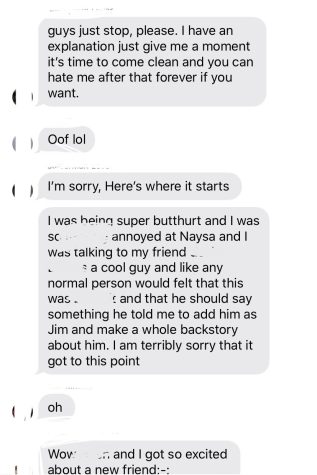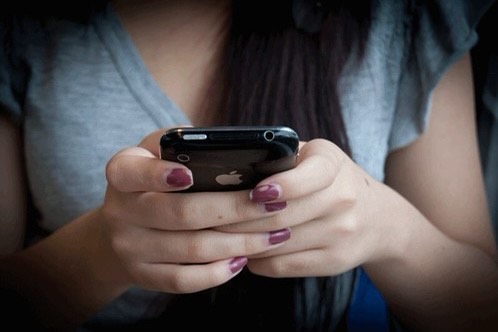RACISM WITHIN
April 29, 2022
My phone was silent, the aftermath of a group chat fight. The events swirled around my head. I tried to ignore it, but I felt unsettled.
My phone buzzed, breaking me out of my worries. I opened my phone to see a paragraph, starting with: “You must have already seen what happened.” I was lost; this message was the first I had seen. My texts told a different story.
“I have received news that Jim has sadly died in a car crash.” With this information, I went back to the text. As I read the message, my mouth dropped. The words dumbfounded me, and for what? To protest the death of a fake person?
It started with a conversation about George Floyd in a theater group chat. I was excited as I love talking about injustices. As the conversation formed, it became one sided; the focus was on the sadness of Floyd’s death. There was no mention of improving, or learning. From there an argument, laced with microaggressions and cyberbullying, formed.
It started with a simple text; “Guys I’m sorry to disrupt the happiness, but y’all know about George Floyd right?”
The chat filled with facts about the murder, condolences, and solutions like “burn Trump at the stake.” The texts I sent went ignored; I asked why they cared, since this wasn’t the first case like this.
“For years I would hear about Black people being killed,” Ari Thomas, 12, commented. “When Floyd died I was surprised it blew up. I was like why? What’s so different about this?”
The answers confused me. Everyone defended themselves, as if they got caught. I expressed my grief, and apologies flooded the chat. One stood out: “We are mad. Don’t get mad at us because we are mad at what seems too late. We don’t know nearly as much as you do. So sometimes we only know when everyone else knows.”
I claimed this ideology is a cycle; that’s when things went awry. “And Naysa, just because we have light skin doesn’t mean we haven’t gotten oppressed in other ways.”
Suddenly, my phone was spammed with messages,comparing average experiences with the burden of racism. Afterwards, the chat fell silent.
Then Valentina came into the chat; “I’m not trying to be mean or rude. I’m trying to state some facts here. We are not saying you’re worthless, we are not saying our problems are bigger. Maybe we have noticed the problems, but sometimes people don’t speak up until someone else does.
“No we can’t relate to you and that isn’t our fault and I get that you’re upset but seriously what you said was kind of rude in some ways. We started the conversation to talk about the society that we live in, and I know that it exists being a person of color and all. I’ve been told to leave and go back to my country because I’m an immigrant and that I’m a terrorist because I’m from South Asia. Just know that we’re telling you, you’re not alone and that we actually care.”
There is a clear difference between the racism the Black and Asian communities face. By stating she’s a person of color, she invalidated my experiences because they differed from hers.
After words were exchanged, I left the chat. Within hours, I was added back along with someone new: Jim from Wisconsin, who was actually a kid from school. As Jim continued to send texts, he attempted to agitate me. He said things like: “There is a clear person that is petty” and “Why is this Naysa person acting very petty?”
My mom intervened, to stop the agitating, but it continued. It ended when Jim sent a message calling me aggressive, petty, and immature. He even said I was threatening people. Words usually used to describe the stereotype of an ‘angry Black woman’.
The next day, everyone was met with a message claiming that Jim died in a crash. I laughed it off, until I read a message a friend sent; “I don’t know what kind of guy Jim was, but LAST NIGHTS ARGUMENT was his LAST experience, and that is a HORRIBLE last experience for anyone to have. I’m not attacking your opinions, you can have whatever opinions you want, but you were definitely being petty last night. Implying a threat and bringing your mom into it was not necessary. I don’t want anyone to leave the world in the way he did, and in my opinion, the only way to fix it is apologize. Not for your opinions, but for the petty way in which you acted, and how you ruined someone’s last hours. I think you should go on the group chat, unblock Vaish, and apologize about how you acted.”
I was fine with the message, but my mom wasn’t. She hated the message because it called out my actions, as if I was the only cause. My mom had me take screenshots of every message: messages from the chat, outside the chat, and of people confessing.

We sent all of it to the principal who claimed that nothing wrong occurred. Not even cyberbullying. I remember her saying, “Well it’s Covid, what could we really do?”
FCPS policy states: “FCPS is committed to responding to all complaints of discrimination in a manner that stops the discrimination, prevents it from happening again, and helps support the person who was discriminated against.” Yet the principal acted directly against this policy.
“I know for a fact, there is a policy in situations like this where the perpetrator gets moved out of classes,” Mackenzie Vance, 10, declared. “I know third graders who have had one little fight and have gotten moved out of classes, but this doesn’t qualify for anything?”
“Say they took it farther than they had and something happened to you,” Jordyn Pinnix, 12, hypotheisized. “Then it would be this big old thing. Why do they have to wait for something bad to happen before they punish students?”
The actions of my peers have started to become addressed. These actions are known as performative activism. Preformative activism is seen on Tik Tok and Instagram; people reposting messages when everyone is, but not once it’s ‘over’.
“I was so used to that treatment,” Kyla Bradley, 12, stated. “I couldn’t tell the difference between preformative activism and compassion. I was like ‘they care, I’m so grateful.”
This has affected everything I’ve done in the past years. I’ve been walking on eggshells, and attempting to educate people. So I’ve been writing articles, going to protests, and supporting my peers, to get the message across.
“I have been racially targeted multiple times. Not only by students, but by adults as well,” Ameerah Byfield, 9, disclosed. “It really affected me. People who do not have black skin and are not black, do not understand the struggles and pain.”
I hope I’ll be able to move on, but it’s been three years and it is still kneeling on my neck.

